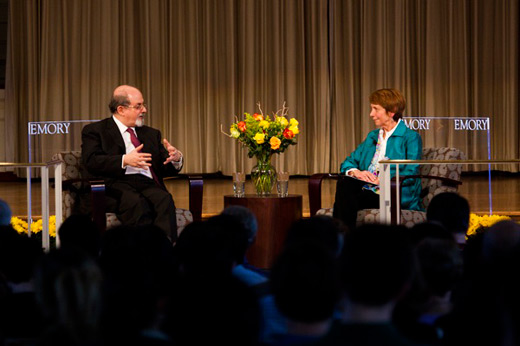Events
March 2, 2011
Rushdie on truth and memory

Distinguished Writer in Residence Salman Rushdie and Vice President and Secretary of the University Rosemary Magee.
By Kim Urquhart
Salman Rushdie, who wrote his latest novel "Luca and the First of Life" during his time at Emory as Distinguished Writer in Residence, is now at work on a memoir, drawing from his vast and varied born-digital archive in Emory's Manuscript, Archives, and Rare Book Library.
"The truth is, I could not have written the memoir at all if it weren't for the work that was done here at MARBL," he told a Glenn Memorial audience Feb. 27.
Rushdie shared this and other insights about the genre during his public conversation with Vice President and Secretary of the University Rosemary Magee on "Truth and Memory."
On truth vs. memory:
"I'm interested in the filter of memory, and how it sometimes reshapes the record," said Rushdie.
"Memory rebuilds our life for us. We believe the truth of the memory more than we believe the facts."
On writing a memoir:
"It's a little easier" than writing a novel, Rushdie said. "You've already taken the precaution of leading the life!" The trick, he said, is to "make people come to life on the page."
In a memoir, you have to be your own harshest critic, he said. But "being ruthlessly honest about yourself" can feel a little like "undressing in public," he confessed.
"I love those memoirs that feel like the work of an artist at his best," said Rushdie.
The memoirs he loathes present questionable truths, which muddies the water for everybody, he said.
On the growth of the memoir:
"We're in a self-obsessed age," a trend Rushdie blames on reality TV's "creation of a confessional culture."
On how history can transform a text:
His biggest creative risk, he said, was writing his novel "Fury" at the time of the events it was describing.
The story's backdrop was New York City. With a release date that happened to be Sept. 11, 2011, "Fury" instantly transformed from a contemporary satire into a historical novel, Rushdie said, describing a city no longer as it was.
On current events:
When asked during the Q&A how his memoir will deal with his clash with religious fundamentalism – Rushdie spent a decade in hiding under a death threat from the Iranian government – he demurred, preferring "not to talk about unfinished books."
Instead, he turned the question of religious fundamentalism to the recent uprisings in the Middle East.
It's a revolution "about democracy, freedom and jobs," he said, not Islam.
"This could be a moment as important as the fall of communism," Rushdie predicted.
Quick Links
File Options
Related Information
Rushdie's 2011 residency events
Rushdie returns; public events planned (Emory Report Feb. 3, 2011)
Get more Soundbites summaries of Emory events.
